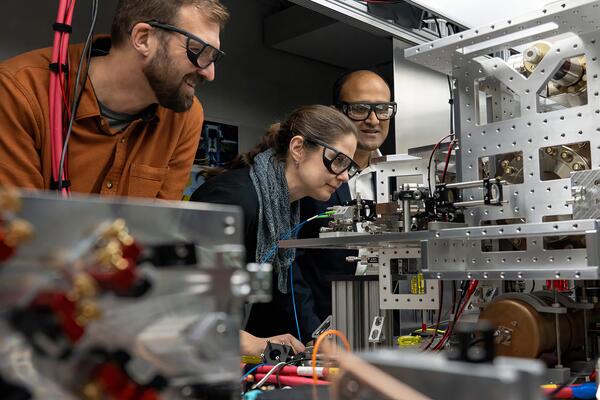
Understanding antimicrobial resistance
City of Kitchener’s Carl Zehr Square goes blue for World Antimicrobial Awareness Week

City of Kitchener’s Carl Zehr Square goes blue for World Antimicrobial Awareness Week
By Milana Madzarac School of PharmacyUnnecessary use and misuse of antibiotics and other antimicrobials are increasing the serious problem of antimicrobial resistance. Over time bacteria, viruses, fungi and parasites change, and as a result, drug resistance can occur where infections that were previously easily treated become difficult to treat.
Antimicrobial resistance ranks among the top ten global public health threats, according to the World Health Organization.
World Antimicrobial Awareness Week (WAAW) runs annually from November 18 to 24 and promotes better understanding of this issue through global reach, education and training. This year’s theme is centered on preventing antimicrobial resistance together.
This week across Canada, landmarks are being illuminated in the colour blue to mark the end of WAAW.
On November 24, City of Kitchener’s Carl Zehr Square joined the University of Waterloo School of Pharmacy, a partner in the national WAAW effort, in the Go Blue for WAAW illumination program.

“While the world has been focused on adapting to the ongoing presence of COVID-19, another pandemic lurks in the shadows,” says Brett Barrett, Clinical Lecturer and Teaching Fellow at the School of Pharmacy.
“Antimicrobial resistance and its impact on patients is less visible but no less damaging, leading to extended hospital stays and death. In order to preserve the usefulness of antibiotics, healthcare providers need to redouble their antimicrobial stewardship efforts. Our program gives frontline pharmacists and prescribers the tools they need to use antibiotics wisely.”
Together we can help combat antimicrobial resistance and preserve effective treatments for future generations.
For more information:

Read more
Waterloo Pharmacy alum spearheads outpatient oncology clinic for patients undergoing cancer treatment at WRHN

Read more
And a new model for how quantum research is shared — opening doors for the next generation of scientists and entrepreneurs

Read more
From optometry and pharmacy to public health and therapeutics, Waterloo alumni are powering Canada’s health care sector
The University of Waterloo acknowledges that much of our work takes place on the traditional territory of the Neutral, Anishinaabeg, and Haudenosaunee peoples. Our main campus is situated on the Haldimand Tract, the land granted to the Six Nations that includes six miles on each side of the Grand River. Our active work toward reconciliation takes place across our campuses through research, learning, teaching, and community building, and is co-ordinated within the Office of Indigenous Relations.